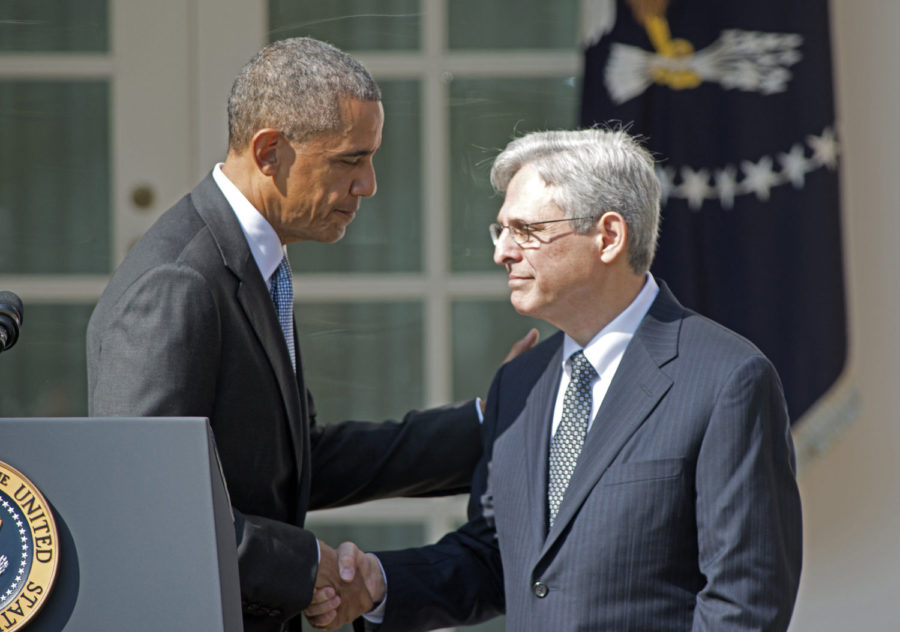Senators offer praise but no vote for Obama’s Supreme Court nominee
April 6, 2016
The Republican blockade of President Barack Obama’s Supreme Court nominee shows no signs of cracking, even as senators who have met with Judge Merrick Garland find little not to like in the seasoned jurist.
On Tuesday, Republican Sen. Susan Collins of Maine heaped praise on Garland after an hourlong private session in which they discussed the Second Amendment, executive reach and the role of the court.
“The meeting left me more convinced than ever the process should proceed,” Collins said outside her office. “If more of my colleagues sit down with Judge Garland, they’re going to be impressed with him.”
Advertisement
But neither confirmation hearings nor a Senate vote is expected. It’s a strategy engineered by Republican leaders to deny Obama’s influence on the court, but that also risks dragging the confrontation battle into the election year, when voters will decide which party controls the Senate.
Republican senators are under enormous pressure from conservative activists to prevent the court’s balance, now split 4-4, from tilting toward a Democratic nominee following the sudden death of Justice Antonin Scalia.
But polls show most Americans disapprove of the blockade, which will probably keep the court short-handed well into 2017.
As lawmakers returned to Washington on Tuesday after their spring break, Senate Majority Leader Mitch McConnell, R-Ky., noted that all but two GOP senators — referring to Collins and Mark Kirk of Illinois — are backing his strategy to leave the vacancy for the next president to fill.
“It is safe to say there will be no hearings or votes,” McConnell said.
The political strains of the Senate’s inaction, though, have begun to show on some senators.
One other Republican, Sen. Jerry Moran of Kansas, had joined Collins and Kirk in calling for consideration of Garland’s nomination, only to scale back his position in the face of political pushback that could include a primary challenge.
Advertisement*
Sen. Charles E. Grassley, R-Iowa, chairman of the Senate Judiciary Committee, has faced repeated questions about his refusal to convene hearings. This week, he announced that he has invited Garland to a breakfast meeting.
The White House has always envisioned a long-game strategy that nudges senators first to take meetings, then to hold hearings and, eventually, to cast a confirmation vote.
But Democrats acknowledged Tuesday the tough road ahead as most Republican senators have been willing to stick with McConnell’s no-vote approach.
“Sadly, so far, it seems to be working,” said Sen. Patty Murray, D-Wash.
They pointed to the situation in Kansas, home base for the powerful Koch brothers, whose network funds many conservative causes, as influencing senators.
“They’re being reeled in, one by one, and that’s too bad,” said Sen. Harry Reid, D-Nev., the minority leader.
So far 14 senators have met with Garland, including three Republicans — Collins, Kirk and, on Tuesday, John Boozman of Arkansas, who is up for re-election in the fall.
Collins acknowledged the difficulty of swaying her colleagues; but she also gave nod to both the quality of the nominee — whom she called “extraordinarily bright” — and the fluctuating nature of the political season that could leave Republicans in an even tougher position if a Democrat wins the White House and picks a more liberal nominee.
“We really don’t know what’s going to happen in this very strange political year,” she said, “so I think what we should do is follow the normal process with the nominee that has been sent up by the president, and that to me is the best way to proceed.”
___
(c)2016 Tribune Co.
Visit Tribune Co. at www.latimes.com
Distributed by Tribune Content Agency, LLC.
Advertisement








